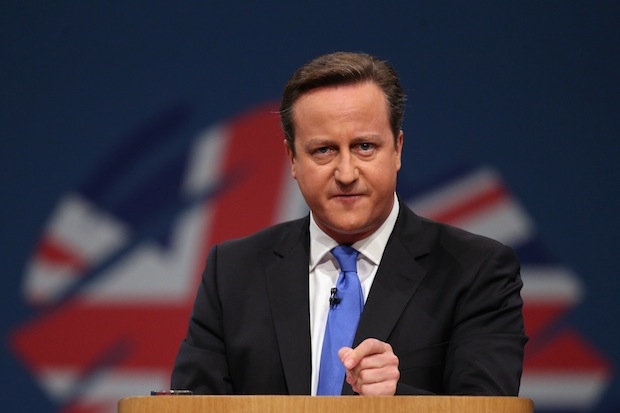A mischievous question, I know, but one prompted by Janan Ganesh’s latest Financial Times column. It is eight years since David Cameron became leader of the Conservative party and three and a half since he became Prime Minister. He may only have 18 months left in either post.
We know – or think we know – a lot about Cameron. He is what he seems to be. Decent fellow, capable in a crisis, unruffled. A better-than-average product of his class and background. Thought he should be Prime Minister because he reckoned he’d “be good at it”.
And yet the thought nags: what is he for? What is Cameron’s ministry about? As Ganesh says, the Prime Minister lacks a project. The economy is George Osborne’s infant, education belongs to Michael Gove. The NHS and welfare reform are best forgotten about (at least for now). Does Cameron have a big idea? (And does he need one?)
He had several once upon a time. But the Big Society disappeared long ago, lost in a guddle of confusion and incoherence. Cameron never quite explained what it should be or how it could make a real difference. A shame, since it was a good idea but plainly too difficult for Whitehall – and Fleet Street – to grasp. Power to the people? A tad too dangerous, that.
The modernising Cameron conceded defeat too. He was going to be the man who made Britain like the Conservative party again. That hasn’t quite happened either. The economy played a part in that disappointment and so, perhaps, did the compromises of coalition. But rather than face down his internal critics Cameron has generally preferred to assuage them. The perception that the Tory party is the Nasty Party has been resurrected. It will hurt the party at the next election.
So what is left? Ganesh suggests infrastructure. Not just a third runway at Heathrow but high-speed rail, new nuclear power plants, fracking and much else besides. These could be packaged together in a manifesto labelled Getting Britain Moving Again. Each of these projects faces considerable opposition, achieving them could create some kind of legacy.
It is not a bad notion. It might even be persuasive. There is an alternative area in which Cameron could choose to fight, however. The constitution. This might seem too dry, too wonkish, too nerdy to matter but it is the arena for the big battles next year.
Not just, obviously, the Scottish independence referendum but Europe too. Each offers Cameron the opportunity to fight for what might be termed the integrity of the United Kingdom. Seeing off the SNP and UKIP is a prize worth winning and something that could, with luck and the proper handling, help create a legacy for Cameron. (It is presumed he desires a legacy, by the way. Most politicians do.)
The ticklish predicament Cameron faces, however, is that at present he has put himself in a position in which, on each of these fronts, he will be blamed for defeat but receive little credit for victory.
Take Scotland first. For reasons that are both obvious and long-masticated, Cameron has declined to play a prominent part in the independence referendum. He does not wish to be seen lecturing Scotland. He also knows that Alex Salmond and the nationalists would love Cameron to come to Scotland more frequently. Denying the SNP the chance to frame the argument as Scotland vs Cameron’s Tories makes tactical sense.
Except the SNP are framing the argument like this anyway. Cameron’s approach may minimise the chance of defeat, they also make it difficult for him to win a great strategic victory for which he might receive some credit. He has chosen to reduce risk at the expense of greater rewards. That is not obviously foolish but it comes at a price.
His European predicament is just as acute. Here too he could conceivably achieve victory without the honour and hosannas that traditionally accompany success. This is partly his own fault since Cameron has not yet defined what victory might look like.
He thinks Britain should remain a member of the European Union and he wants this, I think, confirmed in a referendum just as he’d like Scotland to remain a part of the United Kingdom and have that confirmed by referendum too.
It is not clear, however, how he can pacify his party. Just suppose, for the sake of argument, the Prime Minister is able to win concessions on Britain’s relationship with Brussels and on the future of the EU. How does he persuade his party that these concessions are sufficient? Many of them are already part of the Better Off Out caucus. Cameron could, putatively, win a deal that is “good” for Britain and yet receive little credit for this from his own party or, more generally, in the country at-large.
Alternatively, he could return from Brussels declaring that the EU is irredeemably unreformable and conclude, with appropriate sorrow, that Britain should leave. If he led and won a referendum on that basis he would, for better or worse, have his legacy.
Either way, however, he needs to define his objectives, pick a side, have his referendum and win it. He would become the Prime Minister who fixed Britain’s relationship with the EU for at least a generation (and perhaps much longer). That is not a small prize though it is one that, at present, still seems some way off.
There you have it, however, and I suspect that, in ways that may yet surprise, Cameron’s legacy may be defined by the results of his struggles on these two fronts, one in the north, the other across the English channel. But in each case, he must choose his ground, make a stand and fight.







Comments